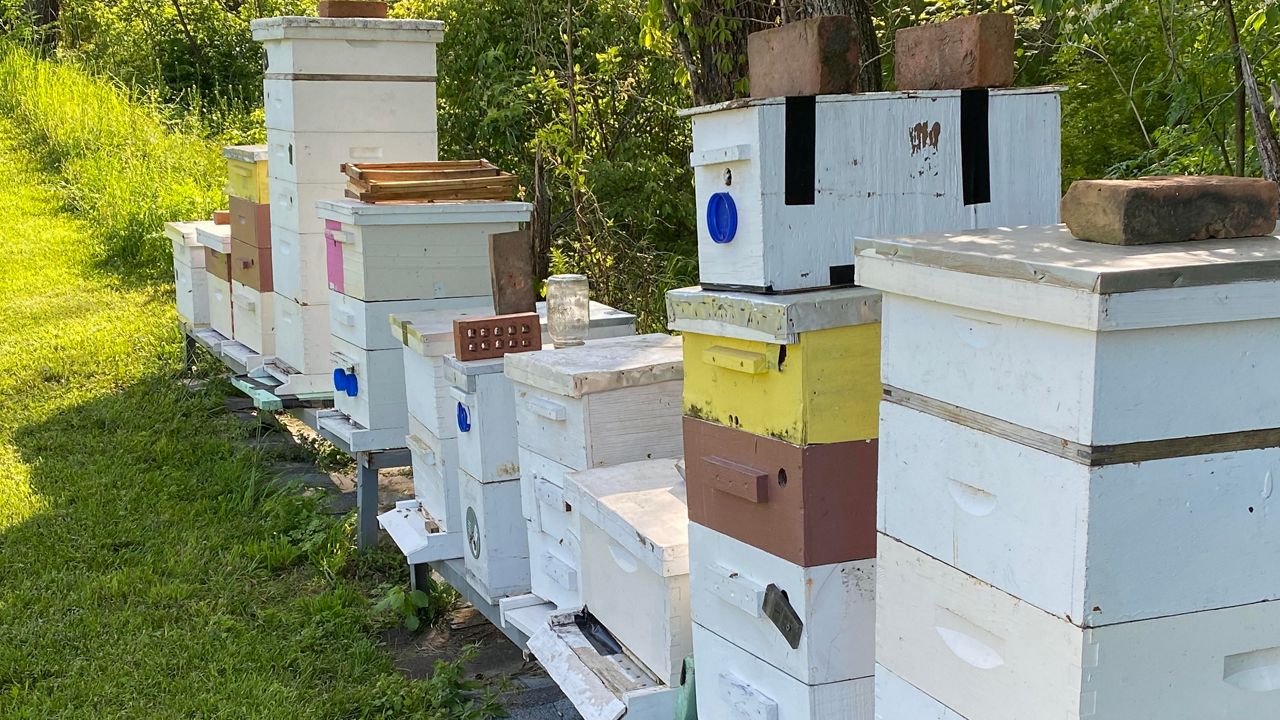COVINGTON, Ky. — While bees are absolutely essential to the Earth's ecosystem, a lot of people’s first reaction when they see a beehive is to get rid of it.
Experts say it’s critical to keep the bees safe when doing so.
What You Need To Know
- The Northern Kentucky Beekeepers Association (NKBA) has already taken a lot of swarming calls this spring
- The NKBA is trying to educate people how vital bees are to the ecosystem
- Things like modern pesticides and parasites have threatened bee populations
- Beekeepers are trying to rebuild those populations with apiaries
Beekeepers are buzzing, heading into what looks to be a swarm-filled summer. Pete Montoure and his fellow beekeeping friends in the Northern Kentucky Beekeepers Association absolutely love bees.
“It just gives you chills to see all those little eyes looking at you, going what are we doing today,” Montoure said. “I can’t even tell you how wonderful this bug is. This is the most important thing on the planet right now. They’re necessary.”
They say everyone should feel the same, or at the least, understand that bees are not the enemy.
“These are very, very important to us as human beings,” Montoure said. “And we’ve been trying to kill it for the last 50 years, dead, and it upsets me. You know, there’s places in the world where they have to go around with a feather and pollinate their fruit, because they’ve killed all the insects.”
The honey bees' produce is just a sweet bonus, the byproduct of pollinating the world’s crops. But things like modern pesticides, parasites like Varroa Mites and a lack of biodiversity have picked away at their population.
Big fields consisting of only one crop, like corn or soy, as has become more common, is not ideal for bees. They prefer having a variety of crops to pollinate.
That’s why the NKBA tries to keep as many bees alive as they can, and bolster their numbers.
Katie Paytes is the NKBA secretary. She started beekeeping when she learned about the decline in bee populations.
“And it just made me think, I don’t know one single beekeeper. And then I thought how cool would it be to be a beekeeper,” she said.
Paytes’ apiary has 20 active hives. Each can have between 30,000 to 60,000 bees at a given time. That’s more than a million bees in her backyard.

Paytes’ fiance, Darrell, and Montoure respond to calls of people who have issues with swarms. Their mantra is to rescue, rehome and relocate.
“So we'll get a call, ‘help, bees are in my attic,’ and that’s when Darrell and Pete go out and help remove the hive safely,” she said.
Swarming issues arise when hives get too crowded.
“So they’ll go, ‘half of us, we’re going to go over to that tree, and we’re gonna find a new place to live.’ So that’s what happens in swarming,” Paytes said.
Montoure said they’ve been getting a lot of calls already this spring.
“It's really a crazy swarm year this year,” he said.
“I believe the reason we’re getting more calls is there’s just more education,” Paytes said. “People know, ‘wait a minute, honey bees are pretty important, I probably shouldn’t spray them with raid.’”
Paytes and Montoure wouldn’t think twice about sticking their bare hand into a hive.
“I’ve been stung so many times. I’m full of venom,” Montoure said. “People freak out on bees. They want to stomp them. They want to spray them, and all that kind of stuff. Just don’t do it. If you just freeze, they’ll usually fly off.”
“For the most part I believe bees are a gentle creature. I don’t believe they want to sting. Now of course they will defend their home, just like any creature,” Paytes said. “If you go up and kick a hive, yeah you may get stung, but generally, they’re very gentle.”
They said they don’t expect people to be as fearless as they are. They just want people to call a beekeeper before exterminating, maybe plant a few flowers and respect the important role the little guys play in life as humans know it.
“The kids need to know that this right here is more important than any of them little phones and games,” Montoure said.



